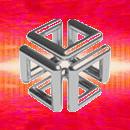SGI_Ben writes:
> Do you guys recon most of the SGI stuff has gone to the tip now ? ...
Most of the SGI equipment was recycled & resold, not scrapped. Some companies did scrap stuff, including SGI, but from
what I've seen over the years the degree of reuse was pretty considerable.
> ... I know there are still a few systems lurking in companies now, I still see the odd Octane and Fuel used on a daily basis and it gives
> me a buzz to see them still running.
There are lots of SGIs still in use; hobbyists don't know about them because the ones still around are used for tasks unrelated to the
most familiar areas of 3D, animation, video, etc.
Most of the items I sell go to medical companies (SGIs used to control medical scanners) and textile manufacturers (SGIs used to control
knitting/printing machines, ie. STOLL/Sirix systems, etc.) Other uses are more unusual, such as O2s used to analyse IR/UV images of pig
carcasses in an abattoir, so that the the cutting tools make more precise cuts, reduce waste, improve quality , so farmers are paid a more
accurate price based on meat quality & quantity. Elsewhere, SGIs are still used for flight sim setups, in some cases driving the display
(eg. Onyx2) but more often for instrument displays or control systems (Indy, Indigo2, O2, etc.) I've been supplying the Australian Airforce
with spares & systems for many years.
> I have been looking for a Fuel myself on ebay but nothing as yet in the uk. ...
Alas I've almost run out of Fuels. All I have atm are a couple of 600MHz systems (one of which is a valuable original Alias/Maya setup)
and a 900MHz system, plus a few that have misc faults.
> I have had to satisfy myself with vintage PC workstation/3d graphics components which can still be had for buttons, although that stuff
> is starting to dry up now as well. Some PC stuff is now ultra rare and can command a good price if you are lucky.
If you're looking for any Quadro cards, I have loads to sell off.
> Just wanted to say to Ian, you have done the right thing building up your stock of SGI stuff as it will only go up in value if you can keep
> people interested and educated. ...
It varies up & down all the time. All it takes is for one particular industry sector to "move on" and suddenly everything shifts. This happened
a long time ago for CAD markets, GIS, etc., but it's not happened yet with medical systems or textiles, probably because in order for the latter
to move on to newer PC systems, they have additional very high costs to consider, such as replacing industrial machinery and recertification
of equipment for health & safety laws, etc. In one case a few years ago (medical scanner), a hospital in France told me it was 100X cheaper
to buy a replacement Indigo2 from me than to replace their SGI setup with a newer PC config.
> I know you do this through your website and it is interesting how the sales side of things and the futuretech website have come together
> as time goes on working in a kind of symbiosis. I am sure this wasn't your initial intention when creating the site.
Not originally, but after I moved back to Scotland in 2004 the idea was to trade in SGI stuff so I could work on the site. Sadly it hasn't worked
out like that; in reality it's very hard work trying to cover the costs every month, so in reality I have much less time now to do my own things
than when I was working as a sysadmin years ago.
I had hoped to branch out into 1980s vintage systems, hence I have quite a collection now:
http://www.sgidepot.co.uk/misc/vintage_Dec2012.zip
but again lack of time has meant I've not been able to proceed with this (I bought two site domains, but they're empty atm).
Now if I didn't have to sleep, that would help. :}
> ... As you said corporate buyers still running the stuff have oceans of money to spend on a spare part if needed and they really need to
> keep that old software running, more so than a hobbyist.
Corporate buyers can be a fickle bunch.

True, some do have the budgets to pay good sums, but a surprising many do not. Finding
the sensible middle ground is key.
The really peculiar thing is that some companies will not buy from me if my prices are too low, because it raises too many questions within
their purchasing departments, ie. why an originally very expensive item can now be replaced or repaired for such a small amount. It's easier
for them if something like a PSU costs a decent amount, because that's what their purchasing dept. expects. Apparently this was the case
with Indys a while ago, I was selling them too cheaply to attract biz buyers. Funny old world.
Ian.

 Credit where credit is due
Credit where credit is due








